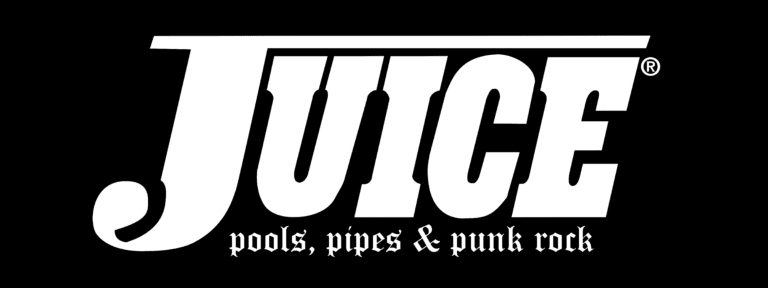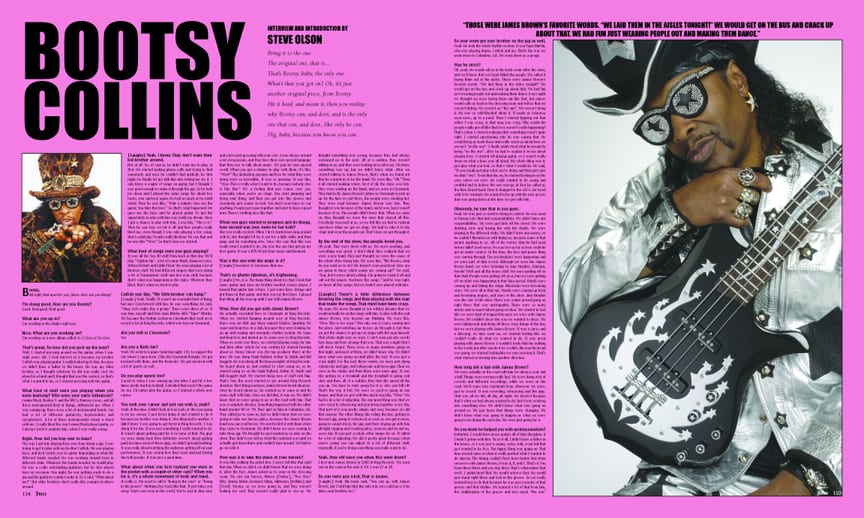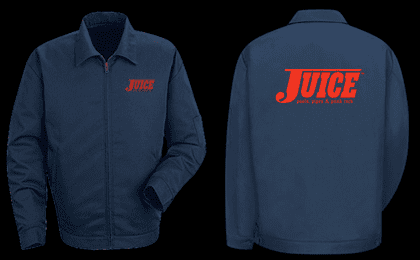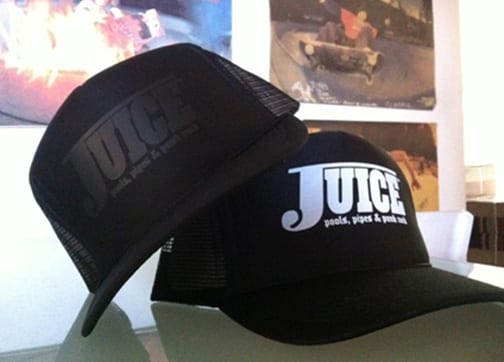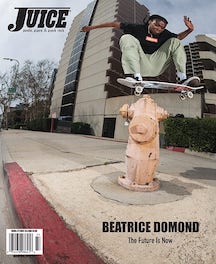INTERVIEW BY STEVE OLSON
INTRODUCTION BY STEVE OLSON
Bring it to the one…The original one, that is…That’s Bootsy, baby, the only one. What’s that you got on? Oh, it’s just another original piece, from Bootsy. Hit it hard, and mean it, then you realize why Bootsy can, and does, and is the only one that can, and does, like only he can. Dig, baby, because you know you can…
“My style was from that whole era of entertainment that we were coming through. There were no walls behind the sky. I could do anything I wanted.”
Bootsy.
That must be you, Steve. How are you doing?
I’m doing good. How are you Bootsy?
Good. Real good. Real good.
What are you up to?
I’m working in the studio right now.
Nice. What are you working on?
I’m working on a new album called In Z Class of Its Own.
That’s great. So how did you pick up the bass?
Well, I started messing around on the guitar, when I was eight years old. I took interest in it because my brother Catfish was playing guitar. I really looked up to him, because we didn’t have a father in the house. He was my older brother, so I thought whatever he did was really cool. He played in a band and I thought that was the coolest. That’s what I wanted to do, so I started messing with the guitar.
What kind of stuff were you playing when you were learning? Who were your early influences?
Lonnie Mack, Booker T. and the MG’s, Ramsey Lewis and all those instrumental kind of things influenced me. When I was coming up, there were a lot of instrumental bands. You had a lot of different guitarists, keyboardists and saxophonists. A lot of those instrumentals struck a chord with me. I really liked the way Lonnie Mack played guitar, so I always tried to emulate him, when I was really young.
How did you hop over to bass?
The way I got into playing bass was from doing a gig. I was trying to get to play with my brother Catfish. He was playing bass, and he’d switch over to guitar depending on what the different bands needed. He was working around town in different clubs. Whatever the bands needed, he would play. He was a really outstanding guitarist, but he also played bass on occasion. One night, he was getting ready to do a gig and his guitarist couldn’t make it. So I said, “What about me?” But older brothers don’t really like younger brothers around.
[Laughs] Yeah. I know. They don’t want their kid brother around.
Not at all. Of course, he didn’t want me to play, at first. He started making phone calls and trying to find somebody. Once he couldn’t find anybody for that night, he finally let me talk him into letting me try it. I only knew a couple of songs on guitar, but I thought I was good enough to make it through the gig. He took me down and I played the same songs for about two hours, over and over again. He took as much as he could stand. Then he was like, “Wait a minute. Give me the guitar. You take the bass.” So that’s what happened. He gave me the bass and he played guitar. To get the opportunity to play with him was really my dream. Once I got a chance to play with him, I was like, “This is it.” Then he saw how we hit it off and how people really liked me. Even though I was only playing a few songs that I could play, people really liked me. He saw that and he was like “Wow.” So that’s how we started.
What kind of songs were you guys playing?
It was all the Top 40 stuff from back in that day. We’d play “Tighten Up”, a lot of Lonnie Mack, Ramsey Lewis, Wilson Pickett and Eddie Floyd. We were playing a lot of Motown stuff. We had different singers that were doing a lot of Temptations stuff and doo-wop stuff, because that’s what was happening in the clubs. Whatever they liked, that’s what we tried to play.
Catfish was like, “My little brother can hang.”
[Laughs] Yeah. Finally. It wasn’t an overnight kind of thing, but once I performed with him, he saw something. He said, “Okay. Let’s make this a group.” There were three of us. It was him, myself and Don Juan Martin AKA “Tiger” Martin. We became the rhythm section in Cincinnati that went on to record a lot at King Records, which was here in Cincinnati.
Are you still in Cincinnati?
Yes.
Are you a Reds fan?
Yeah. We went to a game Saturday night. I try to support the city where I came from. I like the Cincinnati Bengals. We get involved with them, and the Bearcats. We get involved with a lot of sports.
Do you play sports too?
I used to when I was coming up, but after I got hit a few times pretty hard in football, I decided that wasn’t the game for me. I’d rather play the guitar, so I started a whole new career.
You took your career and just ran with it, yeah?
Yeah. At the time, I didn’t look at it as a job, or this was going to be my career. I just loved doing it and wanted to do it because my brother was doing it. One thing led to another. I didn’t know I was going to get hired at King Records. I was doing it for fun. It was just something I really wanted to do. It wasn’t about getting paid for it or none of that. The gigs we were doing back then definitely weren’t about getting paid, because most of those gigs, we didn’t get paid nothing. It was really about watching the audience getting off on your performance. It was seeing how they react and just having fun with people. It was just a good time.
What about when you first realized you were in the pocket with a couple of other cats? When you hit it, it’s a whole movement of body and mind.
It really is. We used to call it “being in the zone” or “being in the groove”. Nothing else feels like that. It just takes you away. You’re not even in the world. You’re just in that zone and you’re just grooving with your cats. I was always around a lot of musicians, and they have their own special language that they use to talk about music. It’s just its own special world. When you get a chance to play with them, it’s like, “Wow!” The dedication, passion and love for what they were doing were so incredible. It was so amazing. It was like, “Wow. This is really what I want to do, because nobody else is like this.” It’s a feeling that just comes over you, especially when you’re on stage. You start jamming and doing your thing, and then you get into this groove and everybody just seems to lock. You don’t even have to say anything. People just come together and start to have a good time. There’s nothing else like that.
When you guys started to progress and do things, how excited was your mom for her kids?
She was really excited. When I first started messing around with it, she thought I’d try it out for a little while and then jump and do something else. Once she saw that this was really what I wanted to do, she was the one that got me my first guitar. It was a $29.99 job from Sears and Roebuck.
Was it the one with the amps in it?
[Laughs] You know it. You know that one.
That’s so ghetto fabulous, it’s frightening.
[Laughs] Yes, it is. The funny thing about it is that I took that same guitar and once my brother needed a bass player, I turned that guitar into a bass. I got some bass strings and put them on that guitar and that was my first bass. I played that thing all the way up until I got with James Brown.
Wow. How did you get with James Brown?
He actually recorded here in Cincinnati at King Records. When we started hanging around over at King Records, there was an A&R guy there named Charles Spurling. He came and heard us at a club, because they were looking for an up-and-coming and energetic rhythm section. He heard us and invited us to come over to King Records. When we went over there, we started playing songs for him and then other artists he was writing for started hearing about us. Henry Glover was the top producer there at the time. He was doing Hank Ballard, Arthur Q. Smith and Bill Doggett. He was doing all the heavyweights at King Records. He heard about us and wanted to start using us, so he started using us on the Hank Ballard, Arthur Q. Smith and Bill Doggett stuff. We started doing tons of stuff with him. That’s how the word started to get around King Records about us. Next thing you know, James Brown heard about us. Once he heard about us, he wanted us to come in and do some stuff with him. Once we did that, it was on. We didn’t know that we were going to go on the road with him. That was a complete shocker. Something happened with his other band around ’69 or ’70. They quit on him in Columbus, GA. They called us to come in, but we didn’t know that we were going to take our heroes’ place, because the James Brown band was our real heroes. We used to kick it with them when they came to Cincinnati. We didn’t know we were coming to take their gig. We thought he just wanted us to play on the show. They didn’t ever tell us what the real deal was until we actually got down there and couldn’t turn around. We had to go on with it.
How was it to take the place of your heroes?
It was like walking the picket line. I never felt like that until that day. When we did it, we didn’t know that we were doing it. After the fact, James asked us to come in the dressing room. We saw our heroes, Maceo [Parker], “Pee Wee” Ellis, Jimmy Nolen, Bernard Odum, Alphonso [Kellum] and [Fred] Wesley, as we were going in, and they weren’t looking too cool. They weren’t really glad to see us. We thought something was wrong, because they had always welcomed us in the past. All of a sudden, they weren’t talking to us, and they were looking at us all crazy. We knew something was up, but we didn’t know what. After we started talking to James Brown, that’s when we found out that he wanted us to be the band. We were like, “Oh.” Then it all started making sense. First of all, the show was late. They were waiting on the band, and we were in Cincinnati. They had to fly James Brown’s plane to Cincinnati to pick us up. By the time we got there, the people were smoking hot. They were mad because James Brown was late. They thought it was because of the band, and it was, but it wasn’t because of us. The people didn’t know that. When we came on, they thought we were the ones that caused all this. Everybody was mad at us, so we felt like we had to redeem ourselves when we got on stage. We had to take it to the stage and wear the people out. That’s how we got through it.
By the end of the show, the people loved you.
Oh yeah. They were down with us. We were smoking, and everything was great. I don’t think they realized that we were a new band. They just thought we were the cause of the whole show being late. We were like, “Mr. Brown, what do you want us to do? We haven’t even practiced. How are we going to know which songs are coming up?” He said, “Son, don’t worry about a thing. I’m going to count it off and call out the names. You know the songs.” He was right. We knew all the songs, but we hadn’t ever played with him.
[Laughs] There’s a little difference between knowing the songs and then playing with the man that made the songs. That must have been crazy.
Oh, man. We never thought in our wildest dreams that we would actually be on the stage with him. To play with the real James Brown, was beyond our thinking. We were like, “Wow. This is too crazy.” Not only was it scary, coming into the place, and watching our heroes go through it, but then we got the chance to get up on stage with the man himself. That whole night was so crazy. I can’t even put into words how deep and how strange that was. That was a night that I will never forget. There were so many emotions going on that night, and most of them, we didn’t know why. We didn’t know what was going on until after the fact. It was just a crazy night. For the next three weeks, we were just doing rehearsals and gigs, and rehearsals and more gigs. Then we were in the studio and then there were more gigs. It was like getting on a treadmill and the treadmill is going real slow and then, all of a sudden, they turn the speed all the way up. You have to start going for it or else you fall off. That’s the way it felt. We were so used to going at one tempo, and then we got with him and it was like, “Wow.” We had to do a lot of adjusting. The one good thing was that we were used to rehearsing and practicing together every day. That part of it was pretty simple and easy, because we did that anyway. The other things like riding the bus, getting to the next gig, going to rehearsal as soon as you get in town, going to sound check, the gig and then staying up with him all night rapping and cracking jokes, went on and on and on, every day. It was just a whole other tempo for us. It called for a lot of adjusting. We did it pretty quick because when you’re young you can adjust to a lot of different stuff, especially if you’re doing something you really want to do.
Yeah. How old were you when this went down?
I first met James Brown in 1968 at King Records. We went out on the road at the end of ’69. I was 17 or 18.
So you were just a kid. That is insane.
[Laughs] Yeah. My mom said, “You can go with James Brown, but I told him that the only way you could go is if he takes your brother, too.”
So your mom got your brother on the gig as well.
Yeah. He took the whole rhythm section. It was Tiger Martin, who was playing drums, Catfish and me. That’s the way we went down to Columbus, GA. We went down as a group.
Was he strict?
Oh, yeah. He would call us in the back room after the show, and we’d know that we’d just killed the people. We called it “laying them out in the aisles.” Those were James Brown’s favorite words. “We laid them in the aisles tonight!” We would get on the bus and crack up about that. We had fun just wearing people out and making them dance. Every night we thought we were laying them out like that, but James would call us back in the dressing room and tell us that we weren’t hitting. We weren’t “on the one”. We weren’t doing it. He was so cold-blooded about it. It made us rehearse even more, up to a point. Then I started figuring out that either I was crazy, or that mug was crazy. Why would the people really get off like that if we weren’t really happening? That’s when I started realizing that something wasn’t quite right. I started questioning why he was saying that. He would bring us back there and really crush us about how we weren’t “on the one”. I finally understood what he meant by being “on the one” after he had to explain it to me about playing bass. I started off playing guitar, so I wasn’t really down on what a bass was all about. My whole thing was to just play what you feel, so that’s what I would do. He said, “If you would just play what you’re doing and then just give me that “one”. From that day on, he started locking in on the zone where we were. He really wanted to be young and youthful and to deliver the new energy. At first he called us the New Breed band. Then it changed to the J.B.s. He toyed with it for a minute. He wanted to be up with the new groove that was going down at the time we got with him.
Obviously, he saw that in you guys.
Yeah. He was just so used to being in control. He was used to having cats that had responsibilities. We didn’t have any responsibilities. We were just kids off the street. We were drinking wine and having fun with the chicks. We were playing in the different clubs. We didn’t have any money, so he couldn’t threaten us with fining us, because none of that meant anything to us. All of the tactics that he had used before didn’t work on us. He was lost as far as how could he get us under control. At the time, the love and peace thing was coming through. The psychedelics were happening and we were part of that crowd. Although we were the James Brown band, we were listening to Jimi Hendrix, Santana, Howlin’ Wolf and all the heavy stuff. We were getting off on that stuff. People were getting off on us, but we were getting off on what was happening in that time period. Bands were coming up and taking the stage. Musicians were becoming stars. We were all in that mix. Bands were coming up front and becoming singers, and stars of the show. Jimi Hendrix was the star of the show. There was a time period going on right there that was unstoppable. There were so many artists and so much talent going on then. We started to feel like we were kind of trapped because we were with James Brown. We couldn’t dress the way we wanted to dress. We were taking acid and doing all these crazy things of the day, but we were playing with James Brown. It was a curse and a blessing. As time went on, we started feeling like we couldn’t really do what we wanted to do. It was great playing with James Brown. I wouldn’t trade that for nothing in the world, but after you do it for a while, the way the trend was going, we started feeling like we were missing it. That’s what started us moving into another direction.
How long did it last with James Brown?
We were actually on the road with him for about a year and a half. Things were moving really fast. We were doing a lot of records and different recordings, while we were on the road. We’d come into Cincinnati from wherever we were, just to record. It was recording, rehearsing and the gigs. That was all we did, all day, all night. We loved it because that’s what we had always wanted to do, but it was evolving into something else. We didn’t know what was going on around us. We just knew that things were changing. We didn’t know what was going to happen or what we were going to be doing the next day. We were just going for it.
Do you think he helped you with professionalism?
Definitely. I would have never gotten all of that discipline, if I hadn’t gotten with him. First of all, I didn’t have a father in the house, so I was just a young, cocky, wild, crazy kid that just wanted to be free. The hippie thing was going on. That time period came in when it really pushed what I wanted to do anyway. The timing couldn’t have been better. When you were with James Brown, it was A, B, and C. That’s it. You learn those three and you stay there. That’s what makes that work. I understood that. He would enforce that. He would just stand right there and lock in the groove. We really learned how to do that because he was just a master of that groove and that rhythm. We learned a lot of that from him, the stabilization of the groove and how much “the one” meant. That’s how I took “the one” over to Parliament Funkadelic. I learned it from James Brown, and then George Clinton took “the one” and made it a whole concept. People don’t know that I got that from James Brown, because he really taught me to play bass. He said, “Son, you’ve got to put it on the one.” Then he broke it down for me.
And it made sense.
Yeah. After he broke it down for me, I understood. At first, I was like, “I don’t understand what you’re saying.” After I understood what he was talking about, it was really easy to do, for me. It was a challenge too because I wanted to play so much more. Back in the day, the bass just did a basic thing. There wasn’t much moving going on. In my bass playing, I did a lot of moving. He loved that, but at the same time, he told me he would love it more if I would put it on “the one”. He drilled that in me. Once I realized I could do that, it made me a better player. Then I really started to understand what playing bass really meant. I never really locked into that before because I started off on guitar and had the mind of a guitarist. Once he kept drilling that into me, I was like, “Oh, okay. This is what you’re talking about.” From then on, it was ever funking on, baby!
FOR THE REST OF THE STORY, ORDER ISSUE #66 BY CLICKING HERE…
SHARE THIS POST:
- Click to email a link to a friend (Opens in new window)
- Click to share on Tumblr (Opens in new window)
- Click to share on LinkedIn (Opens in new window)
- Click to share on Pinterest (Opens in new window)
- Click to share on Twitter (Opens in new window)
- Click to share on Facebook (Opens in new window)
- Click to share on Reddit (Opens in new window)
- Click to print (Opens in new window)
